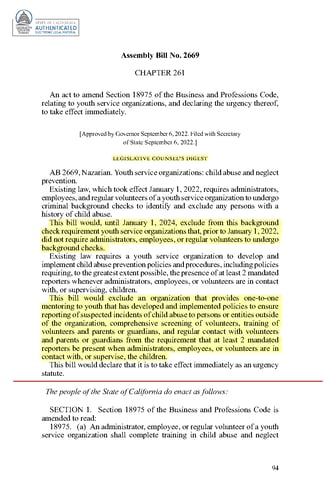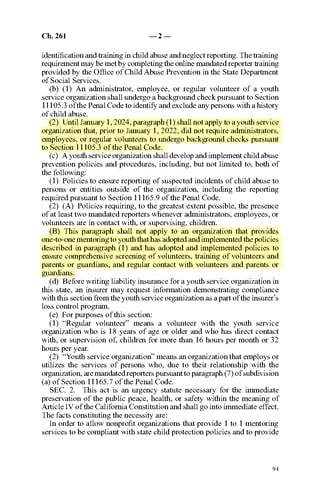AB2669 Makes Two Immediate Changes to AB506
Youth Service Organizations get a little breathing room when it comes to Live Scan background checks
AB506 remains a hot-button issue for churches that minister to children under age 18. Identifying additional mandated reporters other than pastors and church administrators, getting staff and volunteers properly trained, writing, implementing, and monitoring appropriate policies & procedures, and performing Live Scan fingerprint checks are all part and parcel of the legislation which became effective on January 1, 2022. There was no real advance warning or true implementation period, and most “youth service organizations” impacted by AB506 – especially churches – were caught flat-footed at the beginning of the year. Far too many remain out of compliance at this late date.
Youth service organizations did receive some help along this line when, on September 6, 2022, Governor Newsom signed another piece of legislation, AB2669 (see the complete text at the bottom of this blog), which amended the law created by AB506 through the addition of two paragraphs that provide a very small measure of relief under two specific sets of circumstances.
The first change states: “(2) Until January 1, 2024, paragraph (1) shall not apply to a youth service organization that, prior to January 1, 2022, did not require administrators, employees, or regular volunteers to undergo background checks pursuant to Section 11105.3 of the Penal Code.” The reference to paragraph (1) is specifically to the Live Scan fingerprint background check requirement created by AB506. [Business & Professions Code Section 18975(b)] Because of the limited nature of the Live Scan checks, churches should still be conducting national and sexual offender registry background checks.
The second change has limited applicability, if any, to churches: “(B) This paragraph shall not apply to an organization that provides one-to-one mentoring to youth that has adopted and implemented the policies described in paragraph (1) and has adopted and implemented policies to ensure comprehensive screening of volunteers, training of volunteers and parents or guardians, and regular contact with volunteers and parents or guardians.” Essentially, this paragraph relaxes in a very limited way, the recommendation in paragraph (A) that a youth service organization should have “at least two mandated reporters [present] whenever administrators, employees, or volunteers are in contact with, or supervising, children.” [Business & Professions Code Section 18975(c)(2)]
What AB2669 did NOT do is make any changes to the existing requirements for training employees and “regular” volunteers concerning child abuse and neglect – four hours of general abuse and neglect training for mandated reporters, two hours for all other employees and child-serving “regular” volunteers – as well as the creation, implementation, and monitoring of policies & procedures designed to prevent the failure to report any instance of known or suspected child abuse or neglect. There are no short-cuts or “workarounds” to avoid these training requirements or the implementation and monitoring of policies & procedures. They are required to be in place today.
Regular volunteers are defined as those persons to are in contact with children under the watch of a youth service organization at least 16 hours per month or 32 hours per year. Because few churches will have a significant number of volunteers serving 16 hours per month on a regular basis, the prudent practice is to measure volunteer service against the 32 hours per year standard. Sunday School teachers who teach an hour a week will fall under this standard, volunteers who spend 8 hours a day or more with children during a one-week summer camp or winter retreat will fall under this standard. The volunteer leaders or workers in the mid-week youth Bible study that meets for 2 hours every week will fall under this standard.
There can be no harm in screening, training, and performing background checks on all child-facing volunteers regardless of the number of hours they serve. Rather, it demonstrates a church’s profound desire to protect the children under its care.
Should California churches delay applying to the Department of Justice to be approved as a youth service organization until late-2023. NO! Churches that have not already submitted their application to the DOJ should get that process going now. The only thing AB2669 has done is pushed back the date all youth service organizations must begin performing Live Scan background checks. There is no reason not to work toward full compliance with AB506 today.
Yes, there is some cost involved in having fingerprints “rolled,” but there is no other direct cost involved on the part of churches when it comes to Live Scan background checks. The DOJ does not charge a fee to nonprofit organizations. Yes, there will be some administrative expense, perhaps, when it comes to creating policies & procedures, but Church & Ministry Compliance Consulting can help with that . . . and we do not charge for the assistance we offer. There is no direct expense involved in training of mandated reporters, employees, or volunteers because the necessary courses are made available online by the State of California at no cost.
Compliance with the requirements of AB506 is not difficult. But it does require church leaders to make a commitment to doing the right things sooner rather than later. There are a variety of helps available at every step of the process. Our partnership with the MinistrySafe organization can be a large part of that.
For more information, give us a call at 909.618.4841 – we’re available 24/7. Or send an email to max@churchandministrycompliance.org












